Investing in Bitcoin just got easier for average investors. On January 10th, the SEC approved the first batch of spot Bitcoin ETFs, including Fidelity, BlackRock, and Invesco offerings. A total of 11 ETFs received the green light, and 10 started trading the very next day.
For those new to investing, ETFs (Exchange Traded Funds) allow you to buy a basket of assets like stocks or cryptocurrencies through a single investment product that trades like a regular stock.
Bitcoin ETFs, in particular, give you exposure to the price movements of Bitcoin without having to buy, store, and secure the actual cryptocurrency yourself.
This beginner-friendly guide will walk you through everything you need to know to start investing in the newly approved Bitcoin ETFs through your ordinary brokerage account.
We'll cover how to evaluate the different ETF offerings, how to place trades, cons, and critical risks to be aware of.
How do Bitcoin ETF Work
Bitcoin ETF explained: A Bitcoin ETF is an exchange-traded fund that tracks the price of Bitcoin. It holds actual Bitcoin and aims to expose investors to the cryptocurrency's price movements without purchasing, storing, and securing Bitcoin themselves directly.
Investors can buy and sell shares of the Bitcoin ETF on a stock exchange, just like they would trade shares of any other ETF or stock. The ETF's share price fluctuates throughout the trading day, reflecting Bitcoin's underlying value changes.
This allows investors to gain exposure to Bitcoin through a regulated, familiar investment vehicle.
How to Buy Bitcoin ETFs in 2024: A Step-by-Step Guide
If you're interested in buying Bitcoin ETFs, this guide will walk you through the process step-by-step.
Step 1: Open a Brokerage Account
The first step is to choose a brokerage platform that offers spot Bitcoin ETFs. Popular options include Charles Schwab, Fidelity, TD Ameritrade, and Robinhood.
Most online brokers offer a straightforward account opening process. It requires basic information like your name, address, and Social Security number. Once you complete the application and any verification steps, your account will be ready for funding.
Step 2: Fund Your Brokerage Account
Before you can buy any investments, you'll need to deposit money into your brokerage account. Most platforms offer various funding methods, including bank transfers, wire transfers, and even debit card deposits (though fees may apply).
Choose the method that best suits your needs and transfer the funds you wish to allocate to Bitcoin ETFs.
Step 3: Research Available Spot Bitcoin ETFs
With the SEC's approval on January 10th, 2024, a wave of spot Bitcoin ETFs hit the market. While there are currently 11 approved options, do your research before committing. Consider factors like expense ratios (annual fees), liquidity (trading volume), and the underlying holdings of each ETF.
Some ETFs might hold actual Bitcoin, while others might use derivative contracts to track the price.
Here are some resources to help you compare Bitcoin ETFs:
- Financial news websites: Forbes, Reuters, and Bloomberg offer ETF analysis and rankings.
- Brokerage research tools: Most brokerages provide research reports on available investment options, including Bitcoin ETFs.
- Independent ETF research platforms: Websites like https://www.etf.com/ offer in-depth analysis and comparisons.
Step 4: Select Your Preferred Spot Bitcoin ETF
After comparing the options, choose the Bitcoin ETF that aligns with your investment goals and risk tolerance. Consider factors like expense ratios, tracking methodology, and the reputation of the issuer.
Step 5: Place a Buy Order
Once you've chosen your ETF, it's time to place a buy order. Navigate to the order section of your brokerage platform and search for the ticker symbol of your chosen ETF. Here, you'll specify the type of order (market or limit order) and the amount you want to invest (either in shares or dollar amount).
- Market order: This order instructs the broker to buy the ETF at the current market price. It's the quickest way to buy, but you might not get the best price.
- Limit order: This order specifies a price at which you're willing to buy the ETF. It offers more control over your purchase price, but there's no guarantee the order will be filled if the market price doesn't reach your limit.
Step 6: Review and Confirm Your Order
Double-check all your order details, including the ticker symbol, order type, quantity, and price (if using a limit order). Once you're confident everything is correct, confirm your order to execute the purchase.
Step 7: Monitor Your Investment
Bitcoin is a volatile asset, so regularly monitoring your Bitcoin ETF investment is crucial. Track the price movements through your brokerage platform and stay informed about any news or developments that could impact the Bitcoin market.
Remember, investing in any asset carries risk, and past performance does not indicate future results.
Congratulations! You've successfully purchased a spot Bitcoin ETF, giving you exposure to Bitcoin's price movements through a regulated and familiar platform. Remember, this is just a starting point, and continuous research and a well-defined investment strategy are key to long-term success.
Best Bitcoin ETF Platforms in 2024: A Tailored Guide for Every Investor
With a growing number of platforms offering Bitcoin ETFs, it is important to understand these platforms' features and empower you to choose the platform that best aligns with your investment goals and experience.
1. Fidelity Investments: A Haven for New Investors
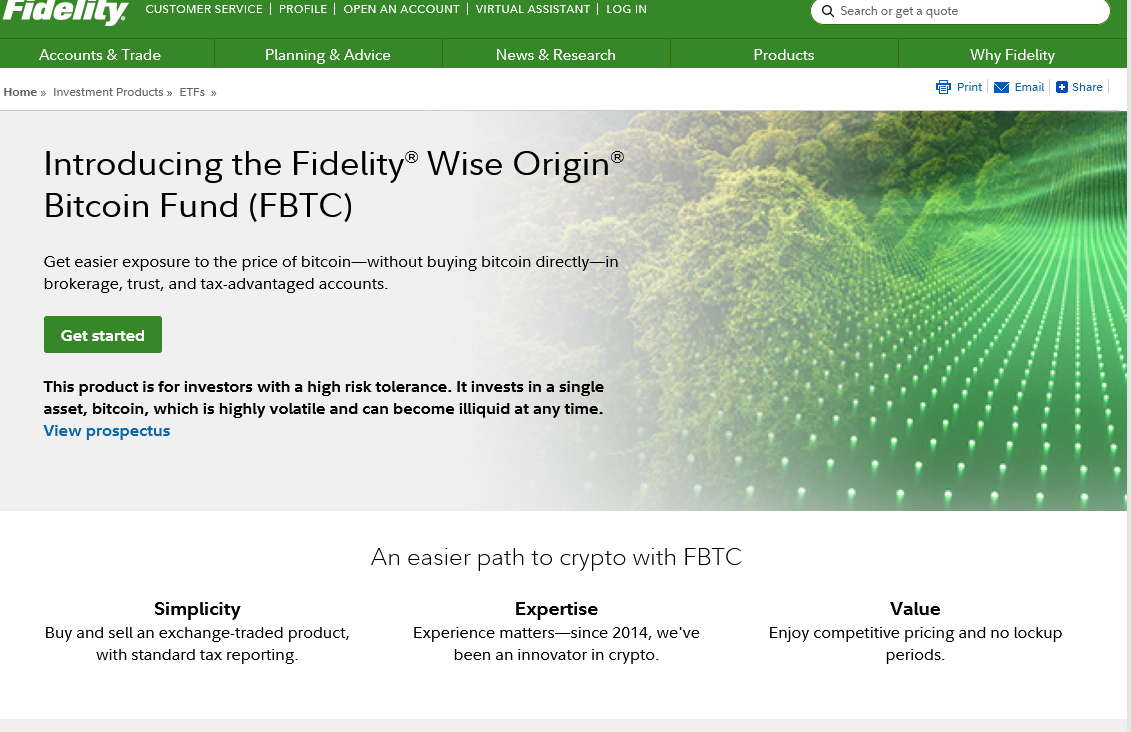
Fidelity Investments stands out as a haven for novice investors venturing into the Bitcoin market. Their reputation for reliability and security fosters trust, which is particularly crucial for those taking their first steps.
The platform itself boasts a user-friendly interface, making navigation and trade execution effortless. Furthermore, Fidelity offers its own Wise Origin Bitcoin Fund (FBTC) with a competitive expense ratio of 0.39%, minimizing fees and maximizing potential returns.
However, Fidelity has limitations.
First, its selection of Bitcoin ETFs is currently limited to its own offering. This might restrict choice for investors seeking diversification across different issuers and tracking methodologies.
Second, Fidelity's services are currently restricted to US residents only. Investors residing outside the US will need to explore alternative platforms.
Start here: https://www.fidelity.com/etfs/fbtc
2. Charles Schwab: Research Powerhouse for Informed Decisions
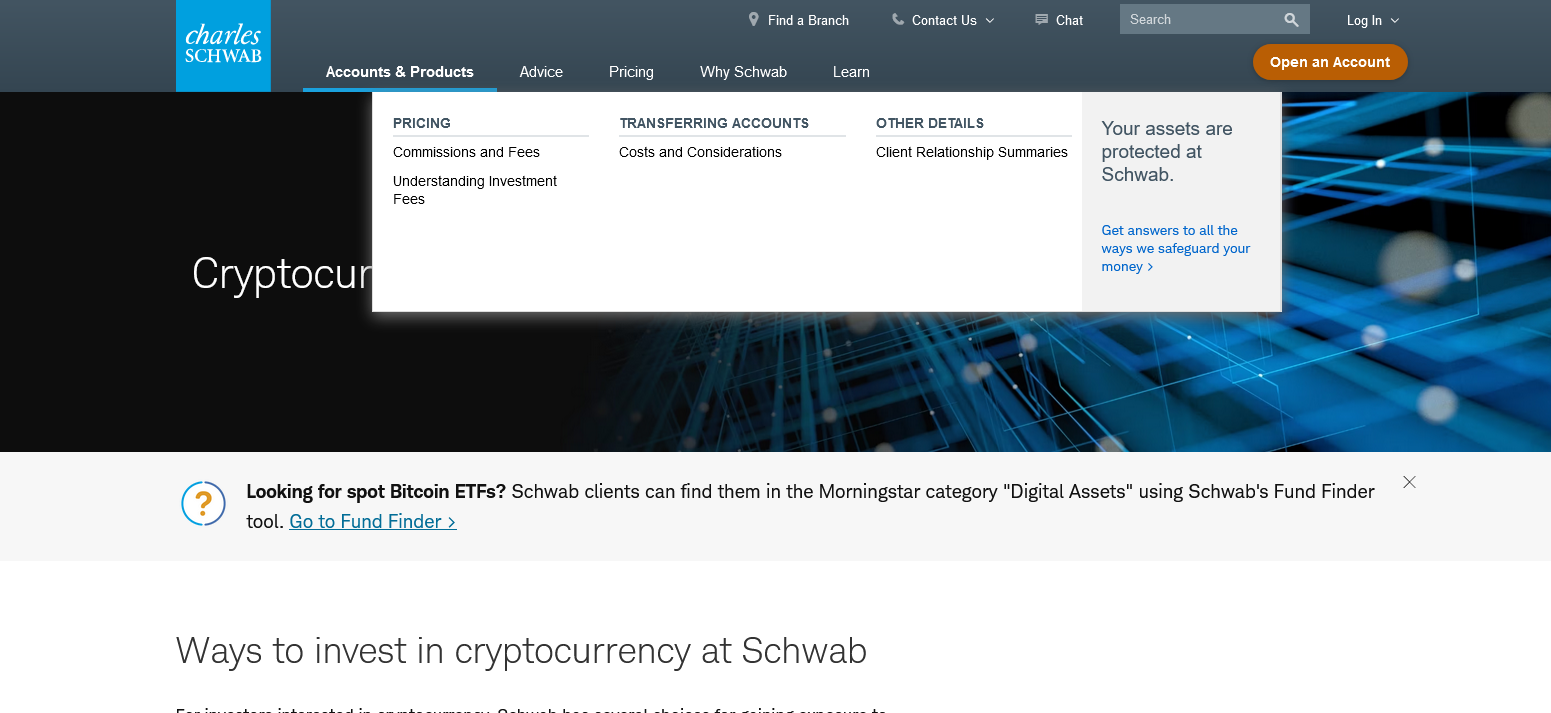
Charles Schwab caters to investors who value in-depth research before making investment decisions. Their platform boasts a robust suite of research tools, enabling you to delve into the intricacies of various Bitcoin ETFs and make informed choices.
Additionally, Schwab eliminates commission fees for ETF trades, allowing you to retain a more significant portion of your returns. They offer access to various popular Bitcoin ETFs, including the low-cost iShares Bitcoin Trust (IBIT), with a competitive expense ratio of 0.12%.
Despite its strengths, Charles Schwab does have a caveat. The platform, while well-designed, might require a slightly steeper learning curve for absolute beginners compared to platforms like Robinhood.
Additionally, like Fidelity, Charles Schwab's services are available only to U.S. residents.
Start here: https://www.schwab.com/cryptocurrency
3. T.D. Ameritrade: A Playground for Active Traders
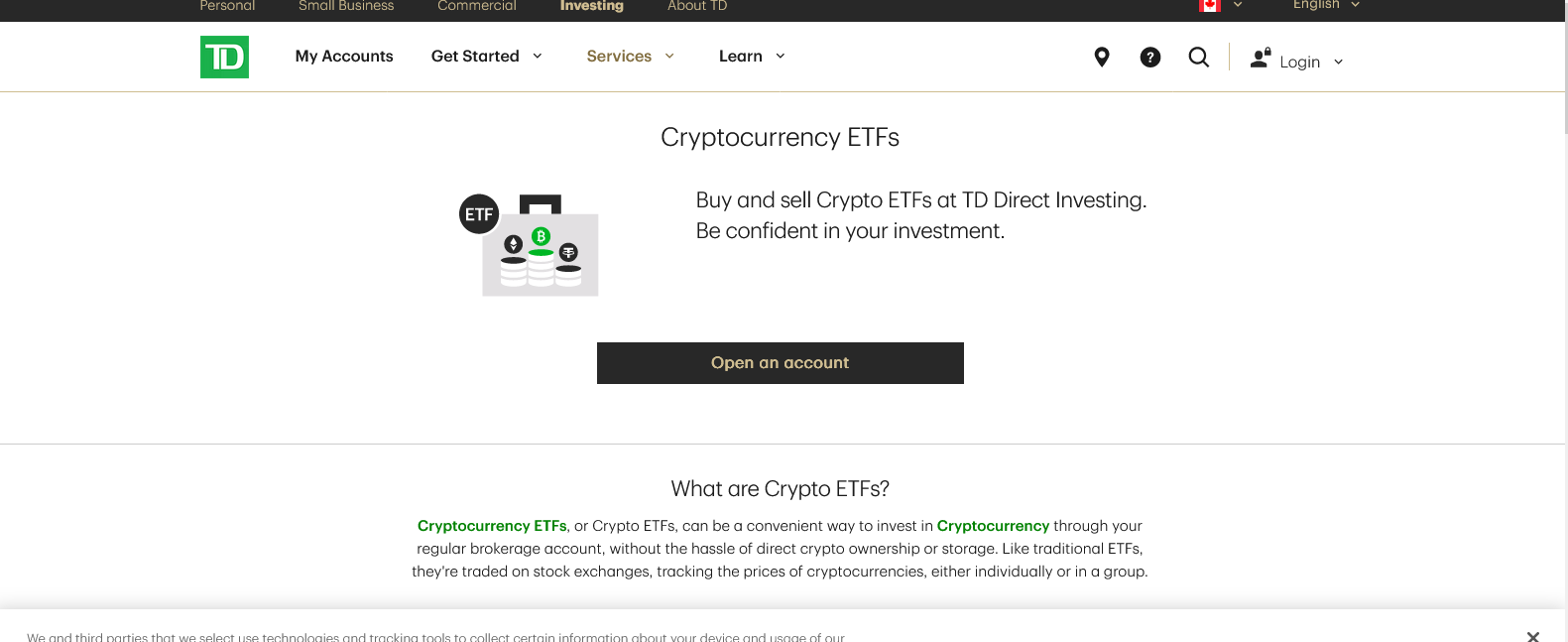
T.D. Ameritrade is a haven for active traders seeking a platform brimming with advanced features and charting tools. Their platform caters to in-depth analysis and strategic trading, empowering you to make informed decisions based on technical indicators and historical data.
Furthermore, T.D. Ameritrade offers the flexibility of purchasing fractional shares of Bitcoin ETFs. This allows investors to participate in the market even with a limited initial investment, fostering greater accessibility. They offer various Bitcoin ETFs, including the Invesco Galaxy Bitcoin ETF (BTCO).
However, there's a trade-off for the advanced features. While offering fractional shares and advanced tools, some Bitcoin ETFs available on T.D. Ameritrade might have slightly higher expense ratios than competitors.
Investors prioritizing low-cost options need to compare expense ratios across platforms before making a decision.
Start here: https://www.td.com/ca/en/investing/direct-investing/investment-types/crypto-etfs
4. Robinhood: User-Friendly Mobile App for On-the-Go Investing
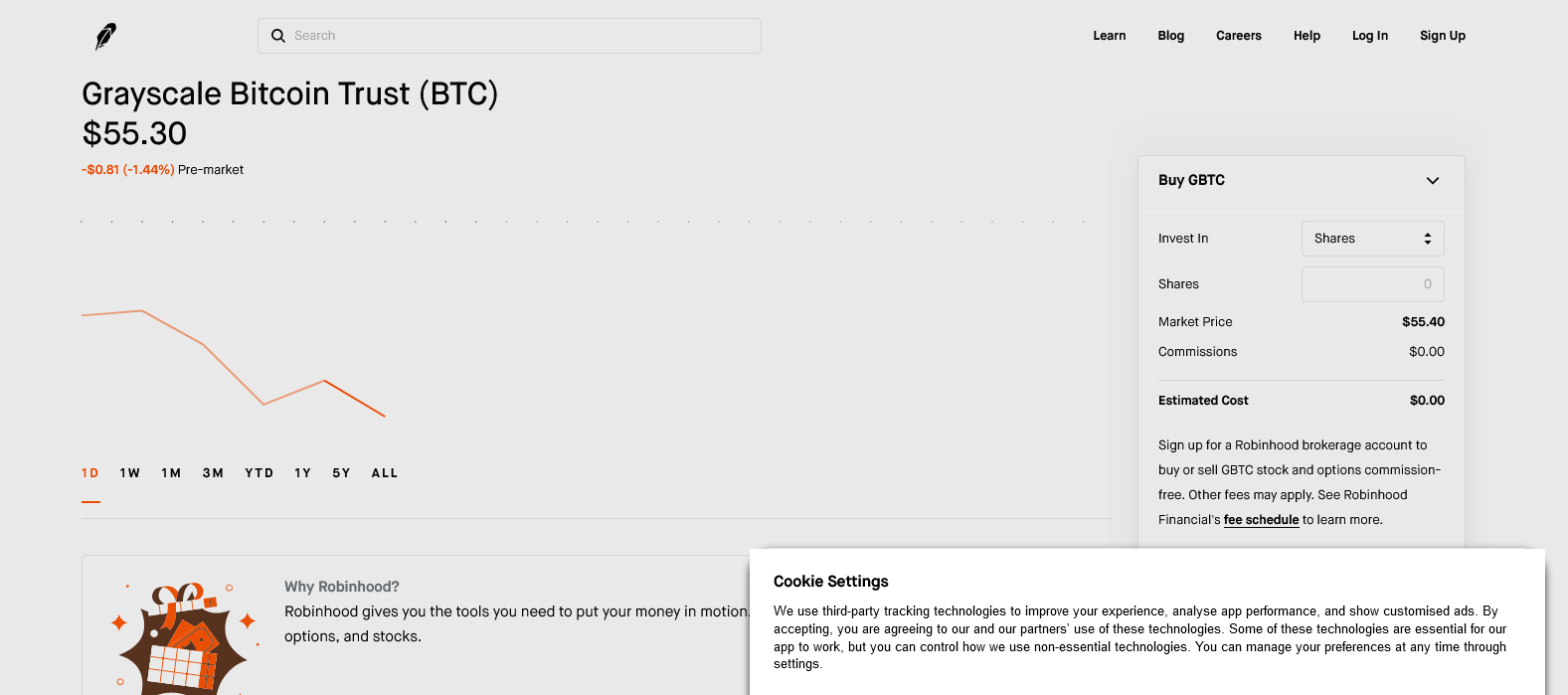
Robinhood has gained immense popularity among beginners for its user-friendly mobile app. It provides a convenient and accessible platform for buying and selling Bitcoin ETFs, making it ideal for investors who prefer a streamlined experience.
Furthermore, like Charles Schwab and Fidelity, Robinhood eliminates commission fees for ETF trades, further simplifying the entry point for new investors. They offer access to well-known Bitcoin ETFs like the Valkyrie Bitcoin Fund (BRRR).
However, Robinhood might only be ideal for some. While user-friendly, Robinhood has a more limited selection of Bitcoin ETFs than other platforms like Interactive Brokers. This might restrict choice for investors seeking a more comprehensive range of options to diversify their portfolio.
Secondly, Robinhood's availability depends on regulations in your country. They currently operate in the U.S., but check their website for updates on expansion plans.
Start here: https://robinhood.com/us/en/stocks/GBTC/
5. Interactive Brokers: A Powerhouse for the Savvy Investor
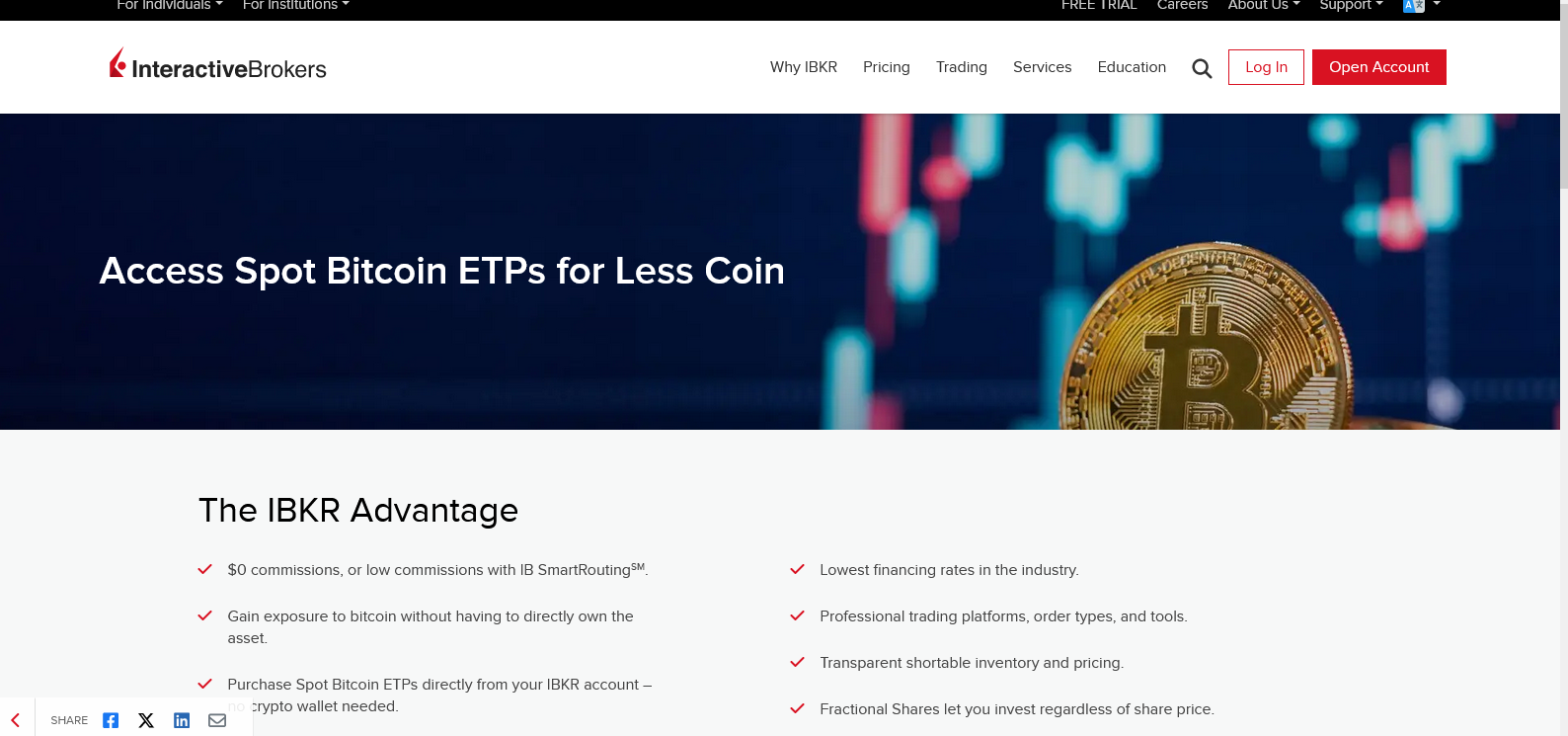
Interactive Brokers caters to experienced investors seeking an extensive selection of investment options. Their platform offers access to various investment vehicles, including international markets for qualified investors (be sure to research regulations in your country).
This unparalleled selection fosters diversification possibilities that cater to sophisticated investment strategies. Furthermore, their platform features extensive charting tools and advanced functionalities tailored towards strategic investment decisions.
However, Interactive Brokers might not be suitable for everyone. For beginners, navigating the platform can be overwhelming due to its extensive features and functionalities. A significant learning curve might be involved before feeling comfortable with all the available tools.
Secondly, while offering a vast selection and advanced tools, Interactive Brokers charges higher commission fees for some trades compared to competitors focused on commission-free investing. This can significantly impact your overall returns, especially for frequent traders.
Start here: https://www.interactivebrokers.com/en/trading/spot-bitcoin-etps.php
6. WisdomTree
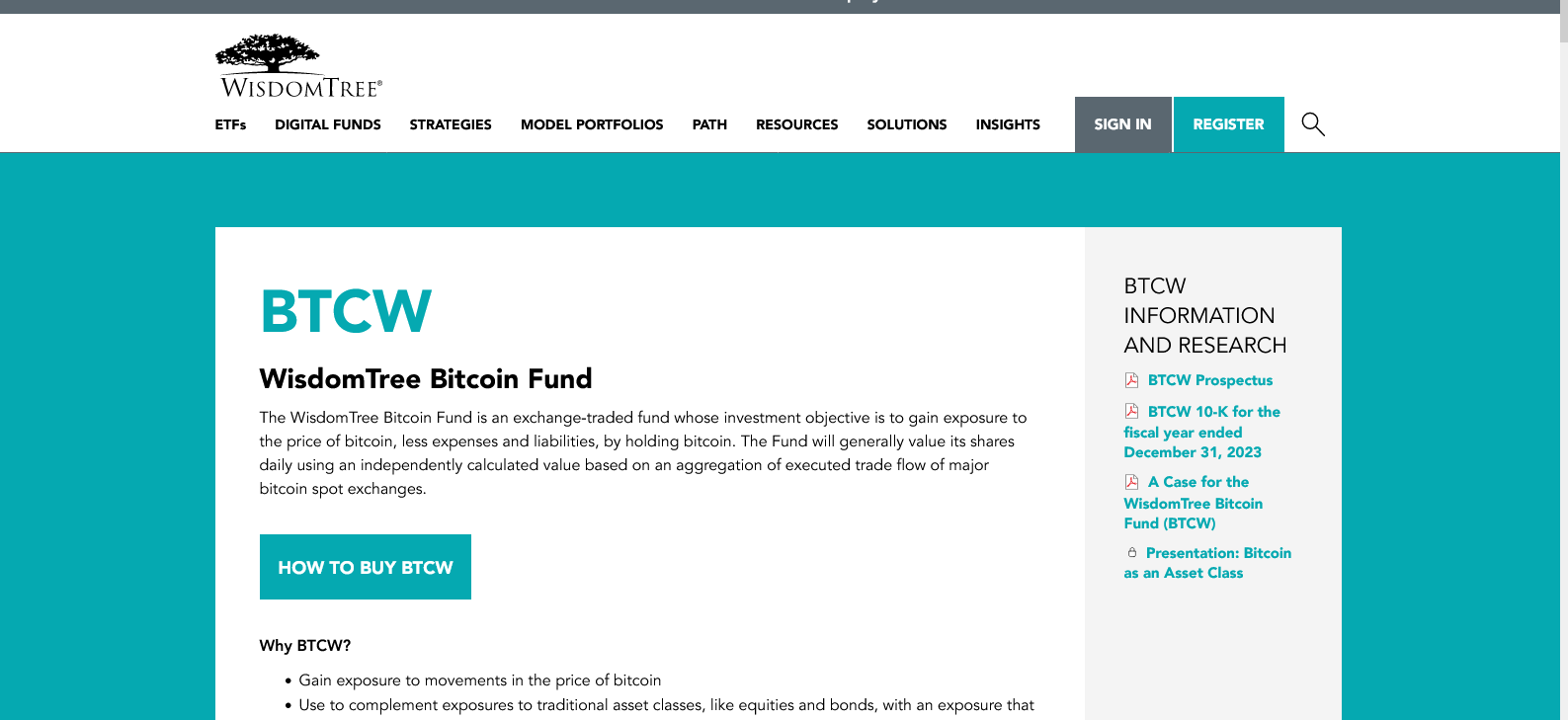
The WisdomTree Bitcoin Trust (BTCW) hit the market in March 2024 as one of the newest entries among the best bitcoin etf platforms. It provides low-cost exposure by tracking the performance of Bitcoin after a lean 0.15% expense ratio.
BTCW is available to investors in the U.S. with no account minimums through major brokers like Fidelity, Schwab, and T.D. Ameritrade. However, country restrictions currently limit availability outside the United States.
As a pioneer in alternative ETFs, WisdomTree brings significant experience and distribution strengths to this space that could make BTCW a popular choice.
Start here: https://www.wisdomtree.com/investments/etfs/crypto/btcw
6. PIMCO
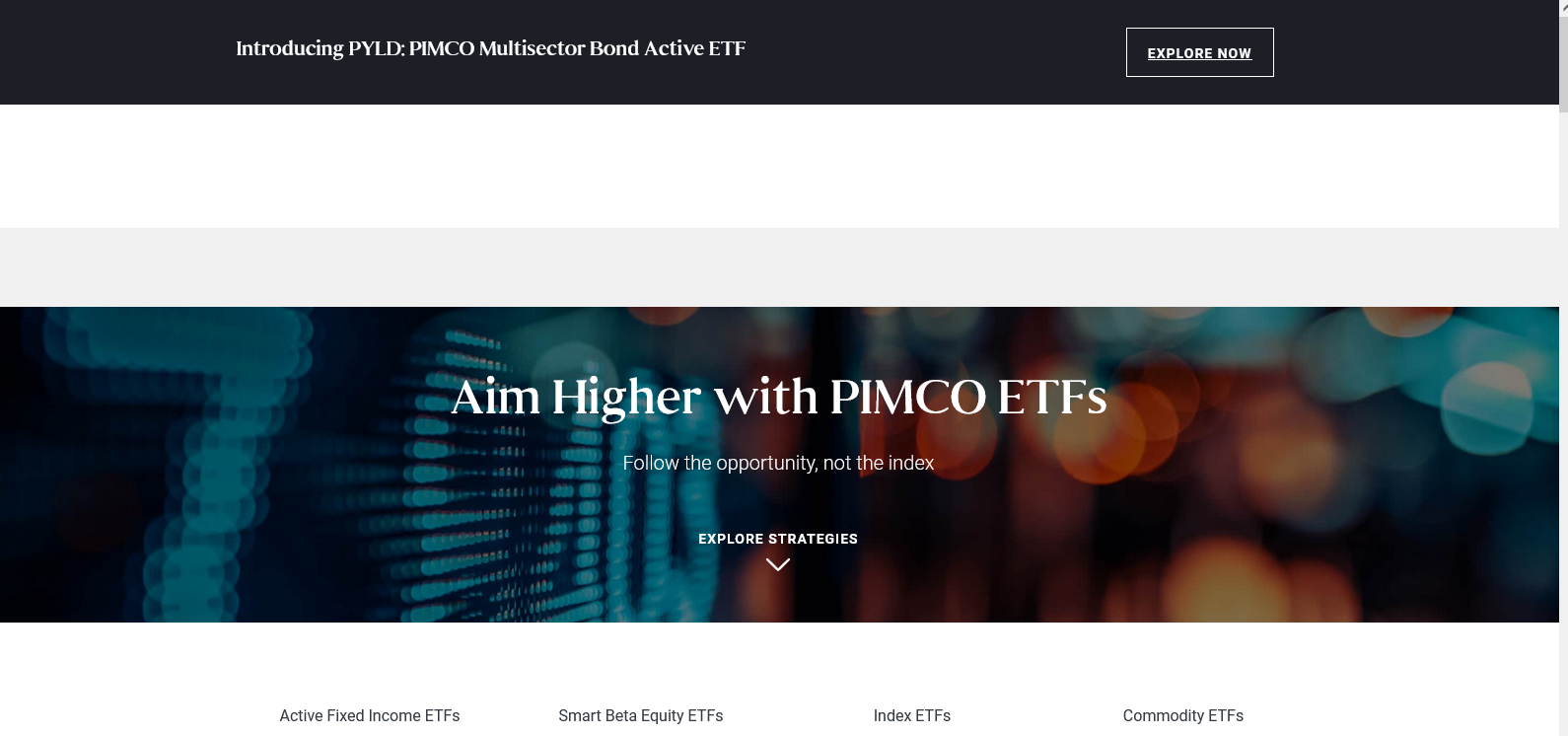
The launch of the PIMCO Bitcoin Strategy Active ETF (BTCP) in early 2024 established fixed-income giant PIMCO as one of the best Bitcoin ETF platforms. As an actively managed product, BTCP aims to outperform spot Bitcoin pricing over a full market cycle.
There are no outright country restrictions, though specific brokerage platforms and client types may initially face availability limitations. The 0.59% expense ratio is about average for an active Bitcoin ETF strategy.
PIMCO's strong reputation and robust research capabilities could make BTCP appealing to wealthier investors and advisors seeking an active approach.
Start here: https://www.pimco.com/en-us/etfs
7. BlackRock
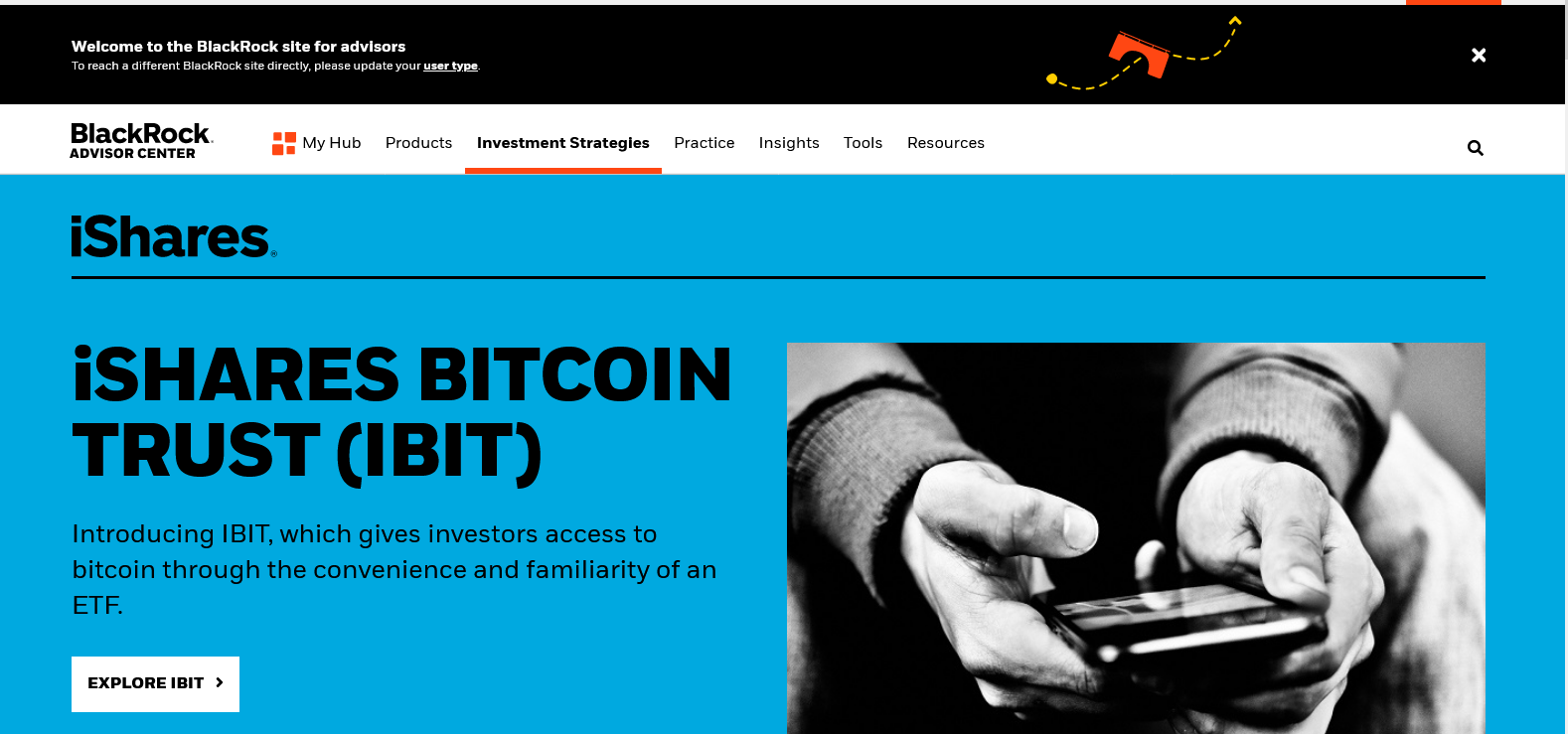
As the world's largest asset manager, BlackRock's entry into the Bitcoin ETF space was highly anticipated. With the April 2024 launch of their iShares Bitcoin Trust (BTCC), they emerged as one of the best Bitcoin ETF platforms.
This passive ETF simply tracks Bitcoin's performance after a 0.40% expense ratio. It has no minimums and is available to investors in the U.S. and various other countries where BlackRock's iShares funds are distributed.
With brand recognition and scale working in its favour, BTCC could quickly become one of the largest and most traded Bitcoin ETFs.
Start here: https://www.blackrock.com/us/financial-professionals/investment-strategies/bitcoin-investing
8. Bitwise
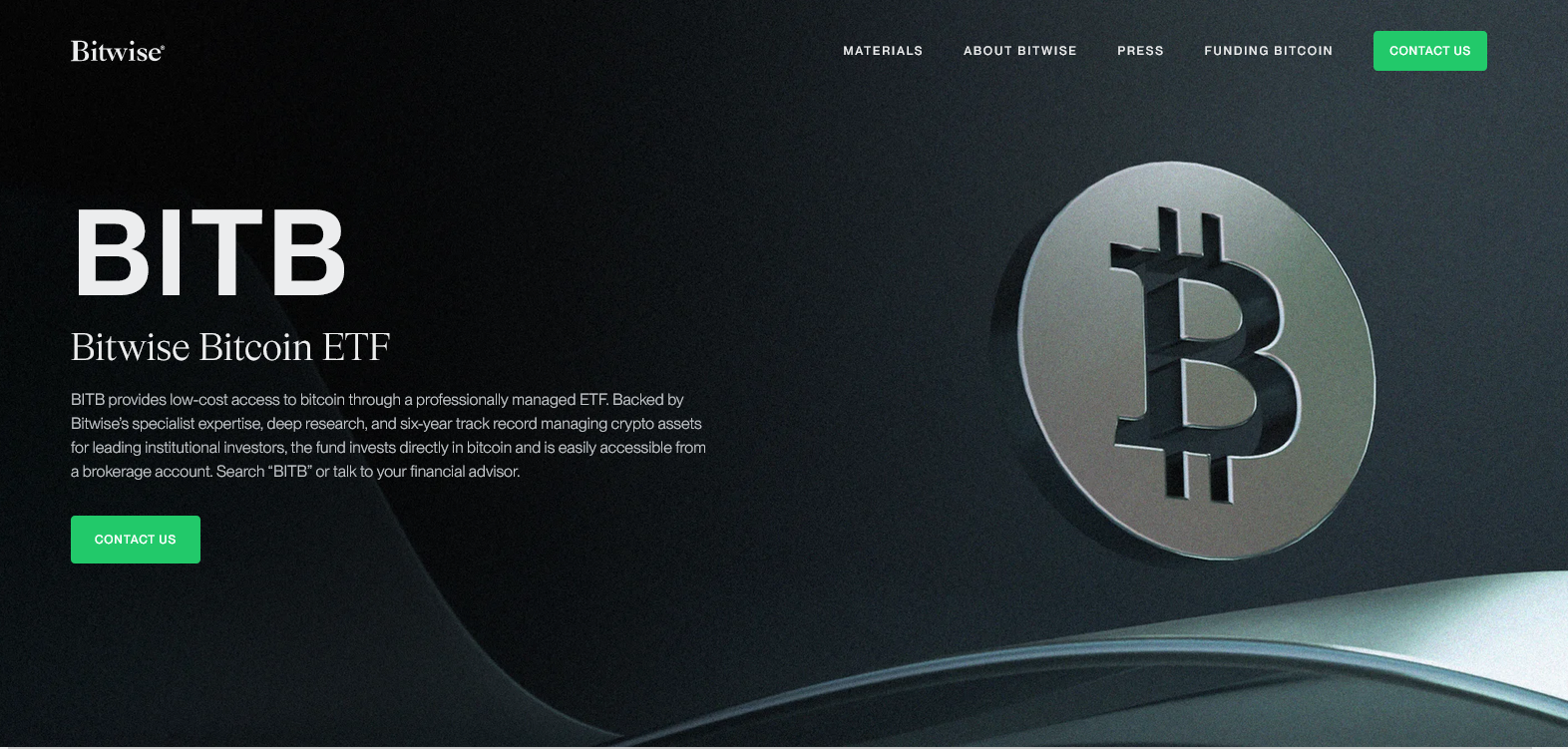
The Bitwise Bitcoin Strategy ETF (BITC) made Bitwise Asset Management a player among the best Bitcoin ETF platforms upon its February debut. As an actively managed fund employing a unique multi-asset crypto strategy, BITC aims to enhance returns versus plain Bitcoin exposure.
While the 0.95% expense ratio is relatively high, there are no account minimums. Availability is currently limited to U.S. investors and certain approved areas.
For those seeking an active, diversified approach beyond just owning spot Bitcoin, BITC attempts to provide a differentiated option.
Start here: https://bitbetf.com/
9. Grayscale
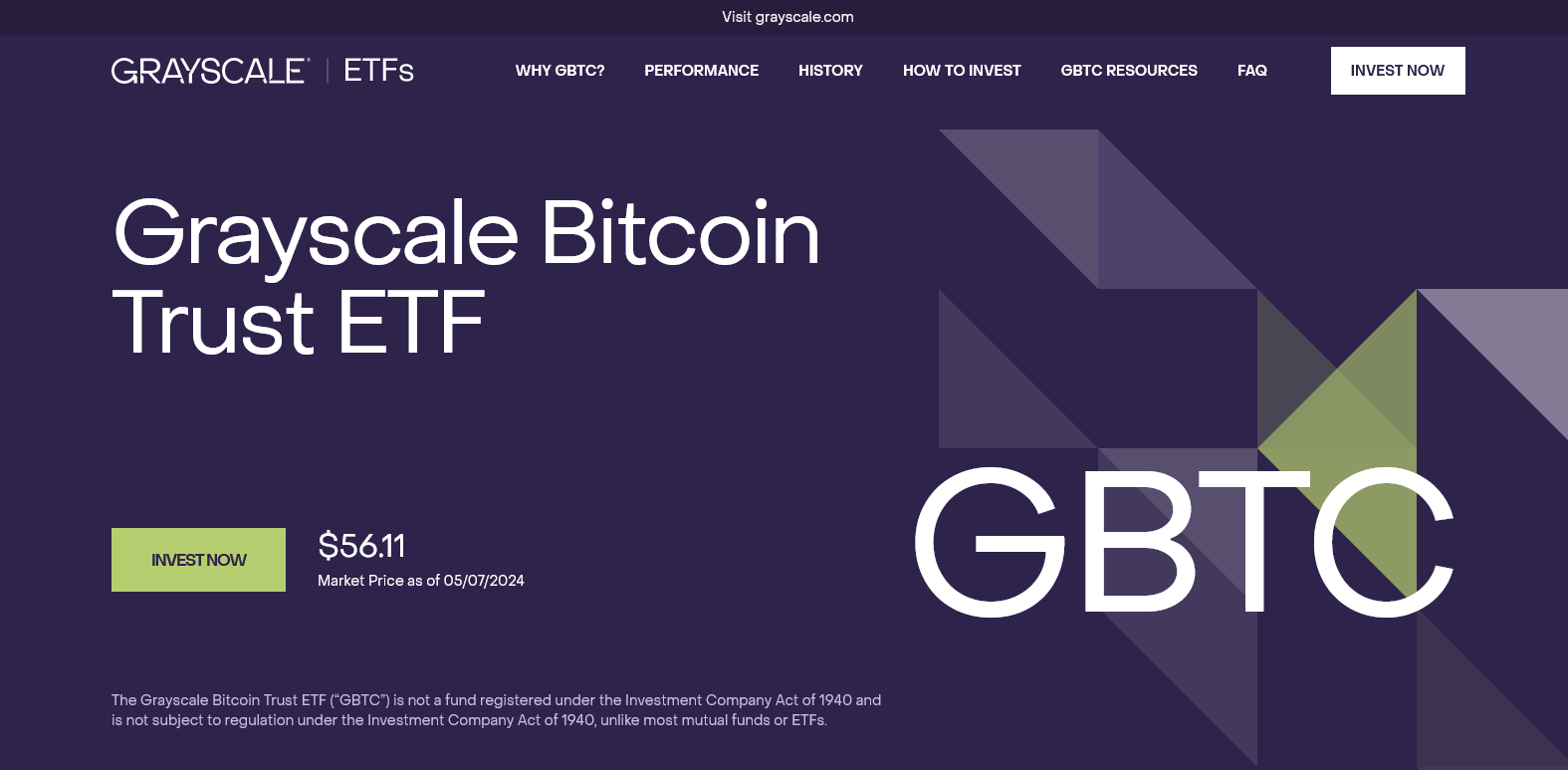
After years of running the popular Grayscale Bitcoin Trust for accredited investors, Grayscale finally converted that product to an ETF in 2024 - the Grayscale Bitcoin Trust ETF (GBTC). This passive fund owns only Bitcoin after a reasonable 0.50% expense ratio.
Due to regulatory hurdles, Grayscale initially rolled out GBTC only to U.S. investors. However, Grayscale plans to expand its global distribution of GBTC to solidify its spot among the best bitcoin etf platforms worldwide.
Start here: https://etfs.grayscale.com/gbtc
Choosing the Best Platform: Matching Your Needs
The "best" Bitcoin ETF platform ultimately depends on your needs and priorities. Consider the following factors when making your selection:
- Investment Experience: Beginners might prioritize user-friendly platforms like Robinhood or Fidelity, while experienced investors may favor the advanced tools offered by Interactive Brokers.
- Investment Goals: Are you looking for long-term exposure to Bitcoin or short-term trading opportunities? The platform's features and available ETFs should align with your goals.
- Investment Budget: Do commission fees or expense ratios significantly impact your budget? Platforms like Charles Schwab or Fidelity offer commission-free trades and low expense ratio ETFs.
- Desired Features: Do you require extensive research tools or fractional share investing? Choose a platform that offers the functionalities you value.
Read: The Next crypto Bull run Tips
Beyond the Platform: Additional Considerations
Selecting the right platform is just one step in your Bitcoin ETF investment journey. Here are some additional factors to consider:
- Understanding Bitcoin: Before investing, familiarise yourself with Bitcoin's underlying technology, its volatility, and the associated risks.
- Diversification: While Bitcoin ETFs offer exposure to Bitcoin, consider diversifying your portfolio with other asset classes to mitigate risk.
- Long-Term Strategy: Bitcoin remains a volatile asset. Develop a long-term investment strategy and avoid impulsive decisions based on short-term price fluctuations
ETFs vs. Direct Bitcoin
For investors comfortable with self-custody and the technical aspects of cryptocurrencies, directly buying and holding Bitcoin provides the most direct price exposure.
However, it also comes with responsibilities around securely storing private keys and managing transactions. This option better suits more experienced crypto enthusiasts.
Bitcoin ETFs, on the other hand, allow investors to gain price exposure through a familiar investment vehicle traded just like a stock. This simplifies access for those unfamiliar or uncomfortable with self-custody. ETFs automatically handle custody, security, and tracking NAV.
For conservative or institutional investors, the transparency and regulatory oversight of ETFs can provide more reassurance around processes and risks. Registered products also unlock tax-advantaged accounts like IRAs for Bitcoin investing.
However, ETFs do carry management fees along with potential premiums/discounts to NAV. So they lack the precise, direct exposure of owning Bitcoin itself. Frequent traders may also prefer avoiding the extra layer.
Overall, directly buying Bitcoin remains appealing for crypto natives valuing decentralization and self-custody. But the convenience, accessibility, and safeguards of Bitcoin ETFs cater extremely well to mainstream investors just looking for price participation through traditional investment channels in 2024.
READ: Best Crypto Wallet 2024
Conclusion
The arrival of spot Bitcoin ETFs in 2024 has opened up cryptocurrency investing to the masses through familiar, regulated investment vehicles.
Reputable issuers like Fidelity, BlackRock, and others have made it incredibly easy for any investor to gain low-cost exposure to Bitcoin's price movements with a simple brokerage trade.
While directly owning Bitcoin still appeals to crypto purists, ETFs provide crucial on-ramps for everyone from institutional investors to retirement savers wanting crypto allocation without self-custody burdens.
With so many high-quality, low-cost options now available globally, ETFs stand to drive immense growth in mainstream Bitcoin adoption over the coming years as the asset class continues maturing.
FAQs
1. Which bitcoin ETF is most successful?
The Fidelity Advantage Bitcoin ETF (CRYP) has emerged as one of the most successful, accumulating over $1 billion in assets under management in just a few months following its launch.
2. How much is the Bitcoin ETF worth?
The total assets under management across all Bitcoin ETFs approved in 2024 have already surpassed $5 billion collectively, showcasing immense investor demand for these new products.
3. What is the point of a Bitcoin ETF?
Bitcoin ETFs provide investors with a convenient, regulated way to gain exposure to Bitcoin price movements without having to purchase, store, and secure the cryptocurrency themselves directly.
4. What is a 3x leveraged Bitcoin ETF?
A 3x leveraged Bitcoin ETF aims to deliver triple the daily returns of Bitcoin's price performance, amplifying both gains and losses through the use of derivatives and debt.